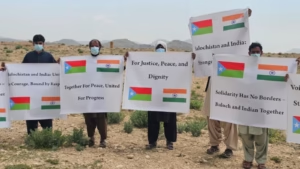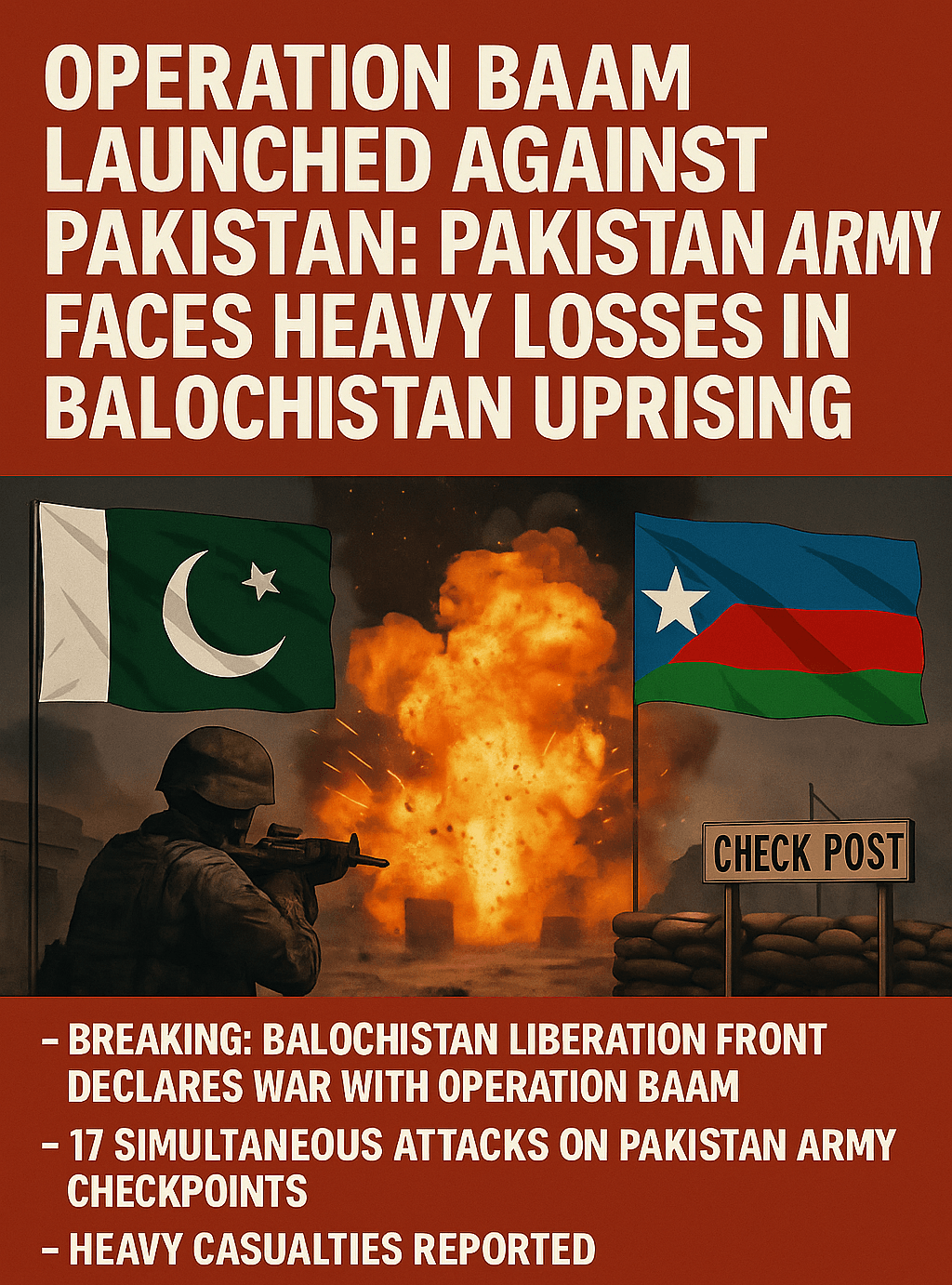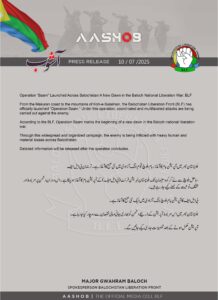Balochistan Liberation Front Declares War With Operation BAAM. In a major geopolitical shocker, the Balochistan Liberation Front (BLF) has launched Operation BAAM, marking the beginning of what many now call the final fight for Balochistan’s independence from Pakistan. The operation, whose name translates to “Blast” or “Beginning,” is not just a tactical assault, but a powerful declaration of intent. Over 17 simultaneous attacks were carried out on Pakistan Army checkpoints and police facilities under this operation. According to resistance leaders, this is just the beginning.
What Is Operation BAAM?
Operation BAAM is a large-scale military-style offensive launched by the Balochistan Liberation Front, a group fighting for the freedom of Balochistan from Pakistani occupation. The name signifies the explosive nature of the mission and the urgency for a separate Baloch state.
Under Operation BAAM:
17 coordinated attacks were executed across Balochistan
Grenade and IED attacks targeted army installations, police checkpoints, and telecom networks.
BLF claims future operations will escalate in scale and intensity
Massive disruption in communication networks forced Pakistan to enforce partial blackouts.
A Nation Within a Nation: The Long-Standing Balochistan Struggle
The freedom movement in Balochistan is not new. The region has seen several uprisings, including:
Operation Hero
Operation Green Bolan
But Operation BAAM is different—not just in execution, but in ambition. It signals a shift from guerrilla warfare to full-scale coordinated military action aimed directly at the Pakistani state.
For decades, the Baloch people have demanded autonomy. The region—rich in minerals, gas, and geopolitical importance—has long felt neglected, exploited, and suppressed.
Pakistani Military Suffers Heavy Losses

According to various reports from the ground, the Pakistan Army has suffered significant casualties during this new wave of attacks. Though the Pakistani state-controlled media is attempting to downplay the damage, eyewitnesses and leaked footage tell a different story.
Explosions rocked army outposts.
Civilian telecom systems were taken offline.
Officers’ homes were specifically targeted.
The BLF claims that this is only a “preview” of what’s to come in the coming months.
The Mind Behind the Movement: Ralph Peters’ Blood Borders Map
The ideological backdrop of this new wave of insurgency stems from an infamous conceptual map created by Ralph Peters, a former U.S. Army officer and geopolitical theorist.
Titled “Blood Borders”, the map suggested a restructured Middle East and South Asia, redrawn along ethnic and tribal lines to bring lasting peace. In this map:
Balochistan is shown as an independent country.
Pakistan is significantly shrunk.
Ethnic boundaries override colonial-era national lines.
“This is not a prediction. This is a possible solution,” Peters had written in his publication.
Many now see the recent Operation BAAM as a possible first real-world manifestation of Peters’ vision.
Balochistan Declares Independence—Symbolically for Now

On May 15, multiple Baloch organizations symbolically declared independence and called upon the United Nations to recognize the Democratic Republic of Balochistan.
What makes this more intriguing is the ideological contrast with Pakistan:
Pakistan: An Islamic theocratic state
Proposed Balochistan: A democratic, secular republic
This ideological divide further fuels the narrative that Balochistan deserves international attention and support.
Why Isn’t India Raising the Balochistan Issue at the UN?
Given India’s growing influence at the United Nations and its support for democratic values, many geopolitical experts are questioning:
Why hasn’t India formally raised the issue of Pakistan-Occupied Balochistan (POB) at the global stage?
Analysts believe that India is waiting for a major geopolitical event—possibly a military conflict involving Iran, the U.S., or Israel—to shift the regional balance.
Once Iran is destabilized or weakened, Pakistan’s grip over Balochistan could weaken further, making it an opportune moment for India to step in diplomatically.
Pakistan’s Weakening Grip on Its Territories
Pakistan today finds itself increasingly isolated. With rising internal instability, economic collapse, and international scrutiny, the cracks in its territorial control are widening.
Key indicators:
Surge in Baloch freedom fighter recruitment
Collapse of local governance in tribal regions
Growing discontent among ethnic minorities
Operation BAAM is a symptom of a larger problem: Pakistan’s failing model of forced unity through military suppression.
Operation BAAM’s Next Phase: What to Expect
The BLF has already hinted at bigger operations. While Operation BAAM was a show of strength, the next wave may include:
Attacks on major military bases
Disruption of critical national infrastructure
Possible hijackings or train sabotage (as seen in Jaffar Express attacks)
Coordination with the Balochistan Liberation Army (BLA) for multi-front operations
The International Community Must Wake Up
So far, global media coverage of Operation BAAM has been limited. But if the insurgency escalates, the world will have no choice but to address:
The legitimacy of Balochistan’s independence demand
Human rights violations by the Pakistani military
Possible role of regional powers like India, Iran, and China
“Balochistan is not just a regional issue. It’s a litmus test for international justice,” said an unnamed Indian diplomat.
Summary: Why Operation BAAM Matters
| 🔹 | KEY FACTS |
|---|---|
| 🚀 | Operation BAAM was launched by BLF. |
| 💣 | 17+ attacks on Pakistani forces |
| 🔥 | Heavy casualties reported |
| 📡 | Communication blackouts enforced |
| 🌐 | Balochistan declared symbolic independence. |
| 🗺️ | “Blood Borders” map resurfaces in discourse. |
| 🇮🇳 | India’s silence at the UN questioned |
| 🌍 | Potential for wider international involvement |
Final Thoughts: A Ticking Time Bomb for Pakistan
Operation BAAM is not just a military campaign—it’s the spark of a revolution. The call for an independent Balochistan is growing louder, bolder, and more organized.
With each passing month, Pakistan faces an existential threat from within, and unless international actors step in, the region could be heading toward a full-scale civil war.
The writing is on the wall.
Balochistan Will Rise—The Only Question Is When.
To get more updates, visit: The Morning Draft.


